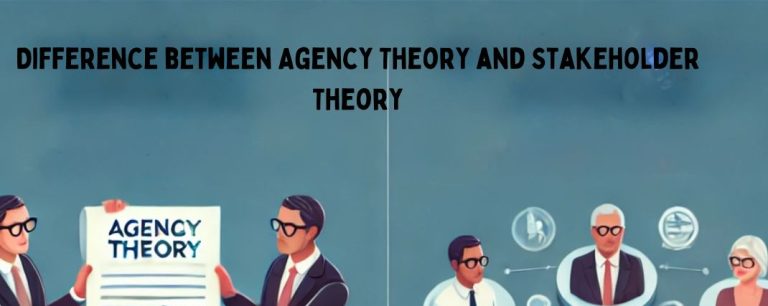The difference between agency theory and stakeholder theory is essential to understanding corporate governance and decision-making in organizations. Both theories provide frameworks for analyzing relationships within firms, but they differ fundamentally in their focus, assumptions, and applications. Agency theory focuses on the relationship between principals (shareholders) and agents (managers), while stakeholder theory expands the scope to include other groups that affect or are affected by the firm’s activities, such as employees, customers, suppliers, and the community. In this article, we will explore the key distinctions, their implications for business strategy, and their influence on corporate governance.
What is Agency Theory?
Agency theory is a concept from economics and corporate governance that addresses the relationship between principals (usually the shareholders or owners of a firm) and agents (the managers or executives who run the firm). The theory is based on the assumption that these two groups have different interests and goals, which can lead to conflicts of interest, also known as agency problems.
- Principal-Agent Problem: The core idea of agency theory is that principals hire agents to act on their behalf. However, the agents may not always act in the best interest of the principals due to differences in objectives, knowledge, or incentives. For example, while shareholders may aim for long-term profitability and value creation, managers may focus on their short-term goals, such as salary increases or bonuses.
- Goal Misalignment: Agency theory suggests that there is a natural conflict of interest between the principals and agents. Since the agents are not fully aligned with the principals’ goals, it is essential to establish mechanisms (such as performance incentives or monitoring systems) to minimize the negative effects of this misalignment.
- Focus on Financial Performance: Agency theory primarily focuses on financial metrics and the maximization of shareholder wealth. The model assumes that the most critical function of any business is to generate profits for the shareholders.
In summary, agency theory is centered around the idea that managers, as agents, need to be monitored and incentivized to act in the best interest of shareholders. This theory is mainly concerned with resolving the conflicts that arise due to the separation of ownership and control within a firm.
What is Stakeholder Theory?
Stakeholder theory, on the other hand, broadens the scope of corporate governance beyond the principal-agent relationship. It suggests that a company’s responsibilities extend to all the parties who are affected by its operations, known as stakeholders. This includes not only shareholders but also employees, customers, suppliers, government agencies, and the local community.
- Stakeholder Identification: Stakeholder theory emphasizes that businesses do not exist to solely maximize profits for shareholders. Instead, companies have a duty to consider the needs and interests of all their stakeholders. This perspective leads to more inclusive decision-making processes that weigh the interests of various groups, which may sometimes conflict with each other.
- Long-term Value Creation: Stakeholder theory advocates that businesses should focus on creating long-term value for all their stakeholders, not just short-term financial returns for shareholders. This may involve prioritizing ethical practices, social responsibility, and environmental sustainability. For example, a firm may choose to adopt environmentally-friendly production methods that benefit the community and customers, even if it temporarily reduces profits.
- Moral and Ethical Responsibility: Unlike agency theory, which primarily focuses on financial outcomes, stakeholder theory integrates moral and ethical considerations into decision-making. It calls for businesses to act in ways that benefit society, promote fairness, and respect the rights of all stakeholders.
Stakeholder theory argues that by aligning the interests of all stakeholders, a company can create a more sustainable and ethically responsible business model, which can lead to long-term success and reduced conflicts.
1. Key Differences Between Agency Theory and Stakeholder Theory
The difference between agency theory and stakeholder theory can be clearly seen in the following table:
| Aspect | Agency Theory | Stakeholder Theory |
| Primary Focus | Focuses on the relationship between shareholders and managers. | Focuses on all parties affected by the company’s operations. |
| Objective | Maximizing shareholder value. | Balancing the interests of all stakeholders. |
| View of the Firm | The firm is seen primarily as a means to generate profit for shareholders. | The firm is seen as a social entity that creates value for multiple parties. |
| Ethical Considerations | Focuses on resolving conflicts through financial incentives. | Incorporates ethical and social responsibilities. |
| Scope of Decision-Making | Primarily concerned with financial decisions and profit maximization. | Takes into account broader social, environmental, and ethical considerations. |
As the table shows, agency theory emphasizes the financial and contractual relationship between principals and agents, while stakeholder theory expands the scope to include the well-being of other parties affected by the firm’s decisions.
2. Practical Applications of Agency Theory and Stakeholder Theory
In real-world business practices, both agency theory and stakeholder theory play vital roles in shaping corporate governance.
- Agency Theory Applications
- Executive Compensation: One of the most common applications of agency theory is in designing executive compensation packages. Performance-based incentives, such as stock options or bonuses tied to financial metrics, are used to align the interests of managers with those of shareholders.
- Corporate Monitoring: Agency theory suggests the use of internal and external monitoring systems to reduce agency costs. This includes financial audits, performance reviews, and managerial oversight.
- Stakeholder Theory Applications
- Corporate Social Responsibility (CSR): Many firms implement CSR initiatives, such as environmental sustainability programs, employee welfare schemes, and community engagement projects. These initiatives reflect the principles of stakeholder theory by balancing the interests of different groups and promoting long-term societal value.
- Ethical Decision-Making: Stakeholder theory is also used to guide ethical decision-making, where businesses consider the impact of their actions on all stakeholders, not just the financial consequences for shareholders.
In practice, many companies blend elements of both theories, seeking to maximize shareholder value while also addressing the interests and needs of a broader range of stakeholders.
3. Challenges in Balancing Both Theories
One of the biggest challenges companies face is how to balance the principles of agency theory with the broader goals of stakeholder theory.
- Agency Costs: A firm that prioritizes stakeholder interests may face higher agency costs if those interests conflict with the financial goals of shareholders. For example, a decision to increase wages or invest in environmental sustainability may reduce short-term profits, which could create tensions with shareholders focused on maximizing returns.
- Stakeholder Conflicts: Another challenge is dealing with conflicting interests between stakeholders. For instance, customers may want lower prices, employees may demand higher wages, and shareholders may seek higher dividends. Balancing these competing demands requires careful negotiation and ethical decision-making.
In such cases, companies often need to make trade-offs and create a decision-making framework that incorporates both the financial imperatives of agency theory and the ethical considerations of stakeholder theory.
Conclusion
The difference between agency theory and stakeholder theory lies in their fundamental approach to business decision-making. While agency theory focuses on aligning the interests of principals (shareholders) and agents (managers) primarily through financial incentives, stakeholder theory emphasizes the importance of considering the needs and well-being of all stakeholders, including employees, customers, and the community. Both theories offer valuable insights, and businesses often need to balance the goals of both perspectives to ensure sustainable long-term success.
Difference between Agency Theory and Stakeholder Theory FAQs
What is the main focus of agency theory?
Agency theory focuses on the relationship between principals (shareholders) and agents (managers), primarily aiming to resolve conflicts of interest and align the goals of both parties.
How does stakeholder theory differ from agency theory?
While agency theory concentrates on maximizing shareholder value, stakeholder theory expands the scope to include the interests of all parties affected by a company’s operations, such as employees, customers, and the community.
What are agency costs?
Agency costs are the costs incurred to resolve conflicts between principals and agents, such as monitoring costs or performance-based incentives.
Why is stakeholder theory important in modern business?
Stakeholder theory is important because it promotes ethical decision-making, encourages corporate social responsibility, and helps companies create long-term value for all stakeholders, not just shareholders.
Can a company use both agency theory and stakeholder theory?
Yes, many companies integrate both theories by focusing on maximizing shareholder returns while also addressing the needs and interests of other stakeholders, such as employees and customers.


